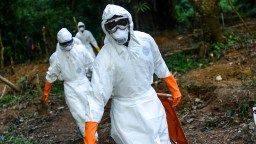Bill Nye has many feathers in his cap — he’s the CEO of The Planetary Society, has a brand-new Netflix show, flew on Air Force One with President Obama, has at least six honorary doctorate degrees and two books to his name — but there’s thing one he’s most proud of, and he shares it with Tracey, a 19-year-old student just beginning her science studies at college. As she steps into a lifelong pursuit of science, Nye advises her on the greatest contribution scientists can make to their community. Dropping awe-inspiring facts and publishing groundbreaking findings are exciting parts of being a scientist but the greatest contribution a scientist can make is to educate people — especially kids from a young age — about the scientific method. Carl Sagan, Bill Nye’s mentor, can explain this in better words than anyone: “Science is more than a body of knowledge, it’s a way of thinking, a way of skeptically interrogating the universe with a fine understanding of human fallibility. If we are not able to ask skeptical questions, to interrogate those who tell us something is true, to be skeptical of those in authority, then we’re up for grabs for the next charlatan — political or religious — who comes ambling along. The people have to be educated, and they have to practice their skepticism and their education otherwise we don’t run the government, the government runs us.” Bill Nye’s most recent book is Unstoppable: Harnessing Science to Change the World.
Tracey: Dear Bill Nye. My name is Tracey, and as of today it is my 19th birthday, and I’m pursuing my education in the sciences thanks to the influence of worldly educators such as yourself. My question to you is: what do you think is the most beneficial thing a scientist can do for the community, and what do you consider your greatest accomplishment as a scientist and an educator? All the best, and thank you for your contributions to the generations ahead of you.
Bill Nye: Tracey. I’m delighted that you are pursuing a career in science. We need as many scientifically literate people as we can in our society so that when it’s time to vote and make decisions about our future we do it in an informed way with science as the background. So thank you. This is fabulous.
As far as my contribution, that’s a very nice question. I think it’s getting young people excited about science so that in the future we’ll have scientifically literate people. And what we want is for people — it’s not just the facts. The facts are great. They often change as we learn more, but the big thing is to get the process of science.
You make an observation, your eyebrows go up, you say to yourself, "My goodness, what caused that?" And then you come up with an idea or a hypothesis of what made that effect happen, this phenomenon that you observed. And then you come up with a way to test it. You test it and then you see what happened and compare what you thought would happen with what did happen. And you’re comparing your hypothesis to the outcome.
If we can get that across to as many people as possible we can, Tracey, dare I say it: we can change the world. That’s a great question.







